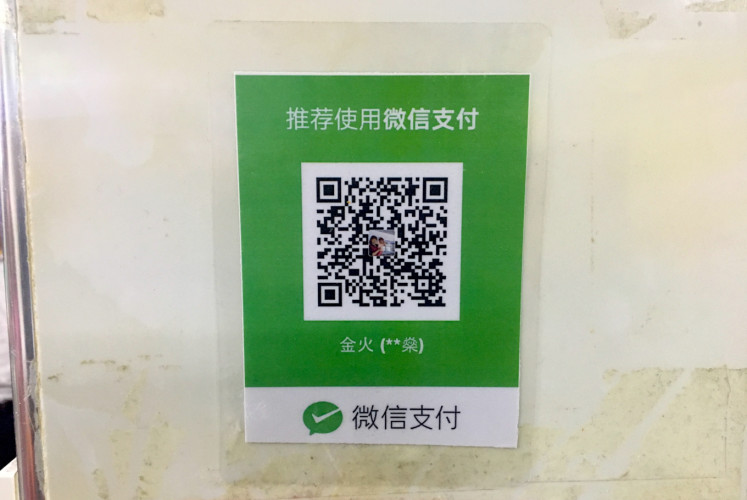Popular Reads
Top Results
Can't find what you're looking for?
View all search resultsPopular Reads
Top Results
Can't find what you're looking for?
View all search resultsSmartphone convenience comes at a risk in tech-driven China
Accept the fact that your personal information might be compromised whenever you use a smartphone in China, sources say.
Change text size
Gift Premium Articles
to Anyone
S
martphone convenience comes at a price in China, where telecommunication technology has been rapidly advancing in recent years despite international criticism over the country's alleged theft of intellectual property.
Owners of smartphones now use them for just about everything from bike-sharing services to taxis and they pay without cash at almost all restaurants and stores -- whether they be kiosks in a village or luxury department stores in a city.
But with convenience comes risks. Accept the fact that your personal information might be compromised whenever you use a smartphone in China, sources say.
Li Chuan, who lives and works for a company in Beijing, is just one among many of a growing number of people who use smartphones for almost all their daily activities.
On a workday when he has overslept, Li hails a taxi using the smartphone app "DiDi," run by Didi Chuxing Technology Co., China's largest ride-hailing firm by number of users and a rival of Uber Technologies Inc.
When he arrives at his office, Li pays his fare by activating messenger app WeChat Pay installed in his smartphone. WeChat users link their bank accounts or credit cards to the payment service.
Alibaba Group Holding Ltd., a Chinese e-commerce giant, offers the same kind of mobile payment app called "Alipay." WeChat, developed by China's IT giant Tencent Holdings Ltd., and Alipay are also rivals.
Mobile payment services are believed to be spreading fast in China to guard against counterfeiting of actual money.
During his lunch break, Li decides to go with his colleague Da Xiong to a Japanese restaurant that has received glowing reviews by China's popular rating app "Dazhong Dianping," with which users can make reservations online.
Since the restaurant is a little far from their office, Li and Da scan QR codes with their smartphones to unlock bikes from a bike-sharing service and pay for the rentals using their devices.
Bike-sharing apps Ofo and Mobike provide rentals of GPS-enabled bikes for a few cents per ride. Users can find yellow Ofo and orange Mobike dockless bikes throughout cities in China. With the "Xiaomidanche" app, it is possible to rent electric motor scooters.
Bicycles, which are parked everywhere and sometimes abandoned by users, often block already-overcrowded streets and sidewalks.
Li pays the restaurant in full after lunch using his smartphone and Da reimburses him later through WeChat, which allows users to send money to their friends registered in the messenger app.
"Oops! My smartphone's battery has run out," Li said on the way back to the office. "Don't worry. You can stop by a cafe around here," said Da. In Beijing, most cafes, restaurants, banks and train stations set up smartphone battery chargers, locals say.
Returning home later, Li gets a delivery of beef steak and French fries from a restaurant and orders a can of beer from a supermarket with the "Meituan Waimai" app. Once a user places an order, deliveries are often made within 15 minutes.
In China, 83 percent of people in nine major cities including Beijing are using cashless payment services, compared with 32 percent in the United States and 35 percent in Japan, according to a survey in October by Hakuhodo Institute of Life and Living Shanghai.
Read also: China: One foot in the past and both eyes on the future
QR code of We Chat Pay in a restaurant in China. Customer scan the code to pay for their foods. (Shutterstock.com/Pixeljoy/File)The research institute established by Hakuhodo Inc., Japan's second-largest advertising company, also said 53 percent of people in China use bike-sharing services, much higher than 6 percent in the United States and 1 percent in Japan.
"When I travel outside China, I always involuntarily go to convenience stores without carrying cash," Li said.
On Dec. 18, China marked the 40th anniversary of its "reform and opening-up" policy aimed at developing a market economy under the Chinese Communist Party. In 2010, it surpassed Japan as the world's second-largest economy.
The Chinese leadership under President Xi Jinping has pledged to create global leaders in robotics, artificial intelligence and other advanced technologies at the state's initiative under the "Made in China 2025" blueprint.
As investment in high-tech enterprises has ballooned with the backing of the government, "Technology has been penetrating in China at a faster pace than the world has ever seen," an official of Hakuhodo Institute of Life and Living Shanghai said.
Chinese users, however, are vigilant of cybercrime. Fake news links are sometimes sent to smartphones and by clicking on them money can be stolen. On a subway, an unknown user tries to befriend others on WeChat to phish individual data.
Chinese citizens are even more concerned that their buying and usage histories are likely being used to determine credibility by research firms and for authorities to tighten surveillance on individuals.
"When you use mobile apps to pay, rent a bike and call a taxi, all the information is recorded and must be provided to such companies," a source familiar with the situation in China said.
"For example, if you don't complete a payment or return a bike in an appropriate manner, your credibility would be diminished, which, in the worst case scenario, would prevent you from using mobile services," the source said.
In addition, information collected through mobile services can facilitate monitoring activities by the authorities, a diplomat in Beijing who asked to remain anonymous said.
"It is easy for the authorities to obtain information about what you bought and ate, where you went, how long you stayed there and what time you went home, because you are like keeping your diary in a cloud database through your smartphone," the diplomat said.
"In China, using a smartphone (coincides) with revealing your personal information by yourself. The information would be checked by the authorities or utilized as sources of big data. If you don't like it, you should give up this convenient life in China," he added.
Many foreign visitors to China, meanwhile, cannot enjoy the same benefits of some mobile apps, which are only available to residents. In urban areas, they struggle to hail taxis and when they use cash, workers at stores or restaurants often show irritation.












